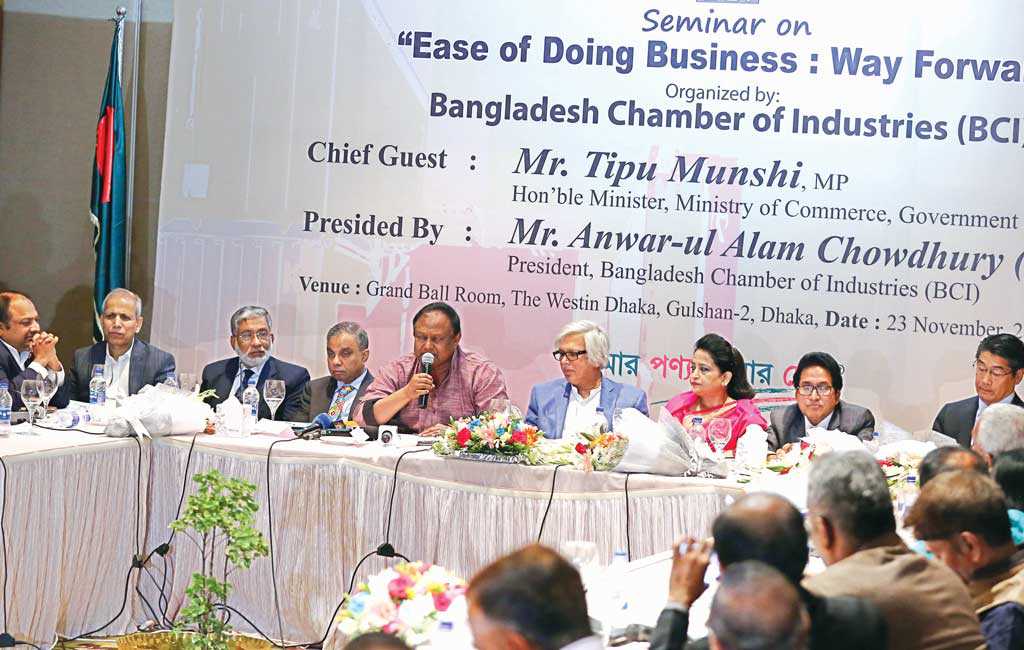Job creation, decentralized dev key to economic transformation

Image collected
Commerce Minister Tipu Munshi was chief guest of the seminar chaired by BCI President Anwar-ul Alam Chowdhury
Employment generation, geographic decentralization of economic activities, addressing income equality and moving to formal sectors from informal sectors are key to economic transformation in Bangladesh.
Besides, more focus on light engineering industries and agro processing industry is needed for export diversification.
Participants came up with these observations at a seminar titled ‘Ease of Doing Business: Way Forward’ organized by Bangladesh Chamber of Industries (BCI) at a Dhaka city hotel on Saturday.
Commerce Minister Tipu Munshi was chief guest of the seminar chaired by BCI President Anwar-ul Alam Chowdhury (Parvez).
Principal Coordinator (SDG) of Prime Minister's office Md Abul Kalam Azad, NBR Chairman Md Mosharraf Hossain Bhuiyan, Bangladesh Investment Development Authority (BIDA) Executive Chairman Md Sirazul Islam and business leaders also were present.
In his keynote paper, Anwar-ul Alam Chowdhury said that the Bangladesh had a robust growth in last 10 years.
But, he said, fewer job, shortage of skilled manpower, income inequality, lack of distribution of economy growth across the country and shortage of industrial infrastructure remained as major challenges for the country’s economy.
“Business leaders should come forward to support our government in formulating polices to diversify and decentralize our economic growth and make it more inclusive,” he stressed.
As per the keynote paper, total employment in 2018 was 6.44 crore and out of that 3.73 crore was in informal sector. Every year 2.2 million people are coming in the job market increase at a rate of 3.1% every year but only 1.6 million was employed in 2018.
In agriculture, employment declined to 25 million in 2018 from 26.2 million in 2010, while in service sector it increased to 23.8 million in 2018 from 19.8 million in 2010 and in industry sector it rose to 13.1 million in 2018 from 12.1 million in 2010.
Former president of Federation of Bangladesh Chambers of Commerce and Industry Shafiul Islam Mohiuddin said that as a driving force, SMEs were very important for a developing country like Bangladesh for economic development, industrialization, generation of employment and poverty eradication.
“The SME sector is especially important to achieve the national development goals,” he added.
He also demanded that interest rates of bank loan should be reduced and corruption and immoral transactions at government offices should be addressed.
The Asian Tiger Capital Partners Chairman Ifty Islam said that the Bangladesh failed to effectively diversify exports with an excessive reliance on RMG while the US-China trade dispute presented an unprecedented opportunity for Bangladesh to attract large new export industries.
“Bangladesh needs a clear and focused plan to take advantage of factory relocations due to US-China trade dispute," he said.
Tipu Munshi said: “We will solve all problems businesspeople are facing. We will sit with government officials and business leaders to discuss how to reduce bureaucratic tangles and improve in the index of ease of doing business.”
The NBR chairman said that the tax-GDP ratio should be increased and to achieve it, the number of tax payers must be increased. "Our present tax-GDP ratio is 10-11% and we want to raise it to 20% within 2030," he said.
Abul Kalam Azad said the government was working to address carefully the 10 issues of the ease of doing business. “We will form 10 teams for the 10 issues. They will work continuously on the issues," he told the program.
“The government has taken a number of initiatives to drive doing business reforms including developing action plans, forming taskforces, coordinating reform initiatives among relevant government agencies, providing reform support to agencies, conducting dialogue with private sector stakeholders, and monitoring reform progress," said the BIDA executive chairman.
Bangladesh Agro-Processors’ Association (BAPA) Vice President Syed Muhammad Shoaib Hasan said that the market for the country’s agro-processed food was expanding very fast, both in domestic and export markets, owing to its excellent quality and reasonable prices.
“Lack of fund for food lab, higher corporate tax and lack of industrial park are major challenges for agriculture processing industry," he mentioned.
Bangladesh Engineering Industry Owners Association (BEIOA) President Md Abdur Razzak said that currently there were about 50,000 medium-scale and 10,000 small-scale light engineering manufacturing units in the country, employing around six lakh people.
Abdur Razzak also said lack of new generation entrepreneur, absence of industrial park and shortage of skilled workforce were challenges facing the sector.
President of Bangladesh Women Chamber of Commerce and Industry (BWCCI) and Member of Parliament Selima Ahmad, FBCCI Vice President Md Rezaul Karim Reznu and other business chamber-associations leaders also were present.
Source: https://www.dhakatribune.com
Previous Story
- Finland keen to invest in Bangladesh
- NY State senators keen to boost investment in...
- Ahsan Khan Chowdhury has been selected as CIP...
- Tanners to pay rawhide traders in three phases
- Bangladesh can reap benefit from US-China trade war
- Dhaka, Tokyo discuss issues of mutual interest
- Stop harassment over VAT collection
- Manage deficit financing from other sources rather than...